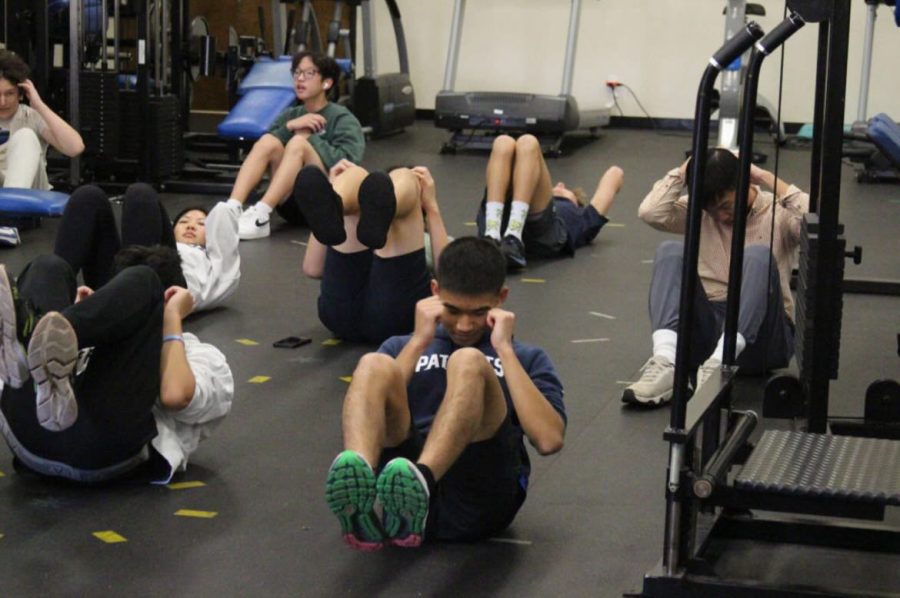The crash of metal and the heavy thuds of rubber plates slamming against the ground are familiar sounds that characterize the often-overlooked McCarthy weight room.
A place where seasoned lifters can max out their lifts or newbies can learn the ropes for the first time, the gym serves as a place for students to venture into something new and continually push themselves.
Fitness has quickly become somewhat of a trend, dominating YouTube views with workouts that promise you “abs-in-two-weeks” during quarantine, every kind of diet under the sun, and creating the quintessential image of the “gym-bro” who hits PRs daily while screaming.
Fitness seems like a complex and unfriendly world, but, in reality, it doesn’t have to be this way. For those who want to get into lifting or simply explore what fitness has to offer, they must be especially wary of the root that makes fitness so difficult to navigate: misinformation.
From self-proclaimed TikTok professionals to those advertising a thousand types of supplements for ad revenue, misinformation, especially for lifting, is exceedingly prevalent on social media. It is easy to compare yourself to those on social media already, but the emergence of misinformation and influencers that employ outlandish claims to draw in an audience gives newbies false and possibly dangerous information.
With a concerning number of videos out there titled “gain ten pounds of muscle with one exercise!” or “take these three supplements to lose five pounds fast!” there is no shortage of too good to be true statements masquerading as empty promises and false hope. Moreover, some influencers even promote dangerous exercises and gain attention for packing on weights for lifts that no one should really attempt (I’m looking at you, ego lifters).
But in all honesty, it is not hard to weed out the fake posts and the downright eyeroll-inducing “informative” Tik-Toks; the real danger lies in the fake promises and subtlety of pressures that social media creates as a byproduct of always showing your best.
It is easy to dismiss a cringe Tik-Tok, but it is not as easy to dismiss the idea of taking a supplement or two to see improvements, or following a strict and unhealthy diet just because an influencer praises it or sees results from it. It is not as easy to scroll past posts of influencers with defined muscles and chiseled physiques who promise that you too, could look like them.
Often unregulated and not individually tailored, supplements and diets are just the surface of navigating the ins and outs of the fitness world, and it is important for one to make sure the information they are getting is accurate and, most of all, safe.
To combat this challenge, the best course of action is to turn to experts who have a professional background in these areas.
At Webb, Dr. Brendan Beikmann, science department faculty and co-adviser of Functional Fitness, is the only NCSA certified trainer on campus. Starting out lifting in high school, Dr. B has gone on to compete in state powerlifting meets, eventually studying kinesiology and obtaining multiple certifications. With a strong and experienced background, he is well-versed in topics of training, fitness, and health.
“I have been doing fitness ever since I was in high school, so it fit the natural progression of things that I enjoyed doing,” Dr. B said. “I started competing in powerlifting in addition to playing football, and once I started doing it, I really enjoyed so I kept going with it.”
During Functional Fitness, Dr. B is there to guide students and ensure all lifters are getting the help they need to create and achieve their goals. Functional Fitness has allowed me to work alongside people who know the ins and outs of fitness and in a safe environment where I no longer have to do everything on my own like I was doing before.
I asked Dr. B five questions around lifting and fitness, hoping to clear up some misinformation about commonly asked questions by getting trusted advice from an expert.
Advice from Dr. B:
- Students do not need supplements. Eating healthy and regularly is the best thing to do for growing teens, and most supplements are unregulated by the FDA. If choosing one, (such as a protein powder) make sure to research heavily and ask people who know how to guide you in the right direction
- Rest days are equally important as training days. Working out daily is not necessary. Rather, look for or create a plan that fits your schedule best and spend your time in the gym wisely.
- For the most accurate information lifters should look towards knowledgeable and certified people and websites such as Bodybuilding.com for workout form centered advice or NCSA.com for more lifting advice. Stay away from TikTok influencers, open forums, and instead look for certified trainers and professionals.
Starting out lifting, there were a number of people I followed whose advice was honestly not the best for my training goals. It was easy to see what was being fed to me through the lens of social media, and I too got trapped in the cycle of comparing myself to these “perfect” influencers online and slipped into bad habits, believing I would reach my goals.
It was difficult looking for advice, only to fall into the wrong hands, and it was even more confusing listening to those who told me to only eat a certain handful of foods because they were “clean” and to take these supplements because then I would see quicker and better results.
Fitness was originally something to help me build up my confidence and to have fun, but because of the wrong information and the allure of social media’s desire for perfection, I began to see fitness as an outlet for control, and the things I saw and heard only encouraged me to continue.
It was not easy to break the cycle, yet the things that slowly helped me leave that mindset were people who had more experience and helped me see training as a way to progress. Now, I see a number of media personalities and outlets trying to raise their voices above the crowd with supportive messages that do remedy the destructiveness of misinformation, but ultimately, the real struggle is one that you must take on yourself.
It is key to prioritize your health and safety. You must ask for help when you need it. There are several people on campus who are readily available to help you create a path that is sustainable and fun. Taking functional fitness was one of the best decisions for my fitness journey because it has shown me that I have a place full of people who I can trust and rely on to create a positive mindset for progress.
When building a training plan and fitness regimen, it’s important to always think about what would be best for you. Find out what works with your schedule, your needs, your goals, and focus on how you feel. Create a foundation of knowledge, and seek to build up from there; however, to get that knowledge, make sure you are learning from reputable sources of accurate information.
In the end, fitness should be about making a healthy lifestyle fun. Seeing results from hard work, pushing yourself to become better, and building confidence are all things that make the process worth it, and it should never be something you dread or harm yourself for.







![Many Webb students spend their free time in the library watching a popular TV show like Riverdale and Euphoria. “Based off what I’ve seen, like in Euphoria, because the actors are older, they don't showcase an actual high school life properly,” Sochika Ndibe (‘26) said. “Since [the actors] are older [and] playing a teenager, from a girl’s perspective, it is going to make you think you should look more developed at a young age.” The actor, who plays Veronica Lodge, was 22 years old at the time of filming.](https://webbcanyonchronicle.com/wp-content/uploads/2025/03/Antecol-Media-affects-how-society-functions-graphic-1200x900.png)







